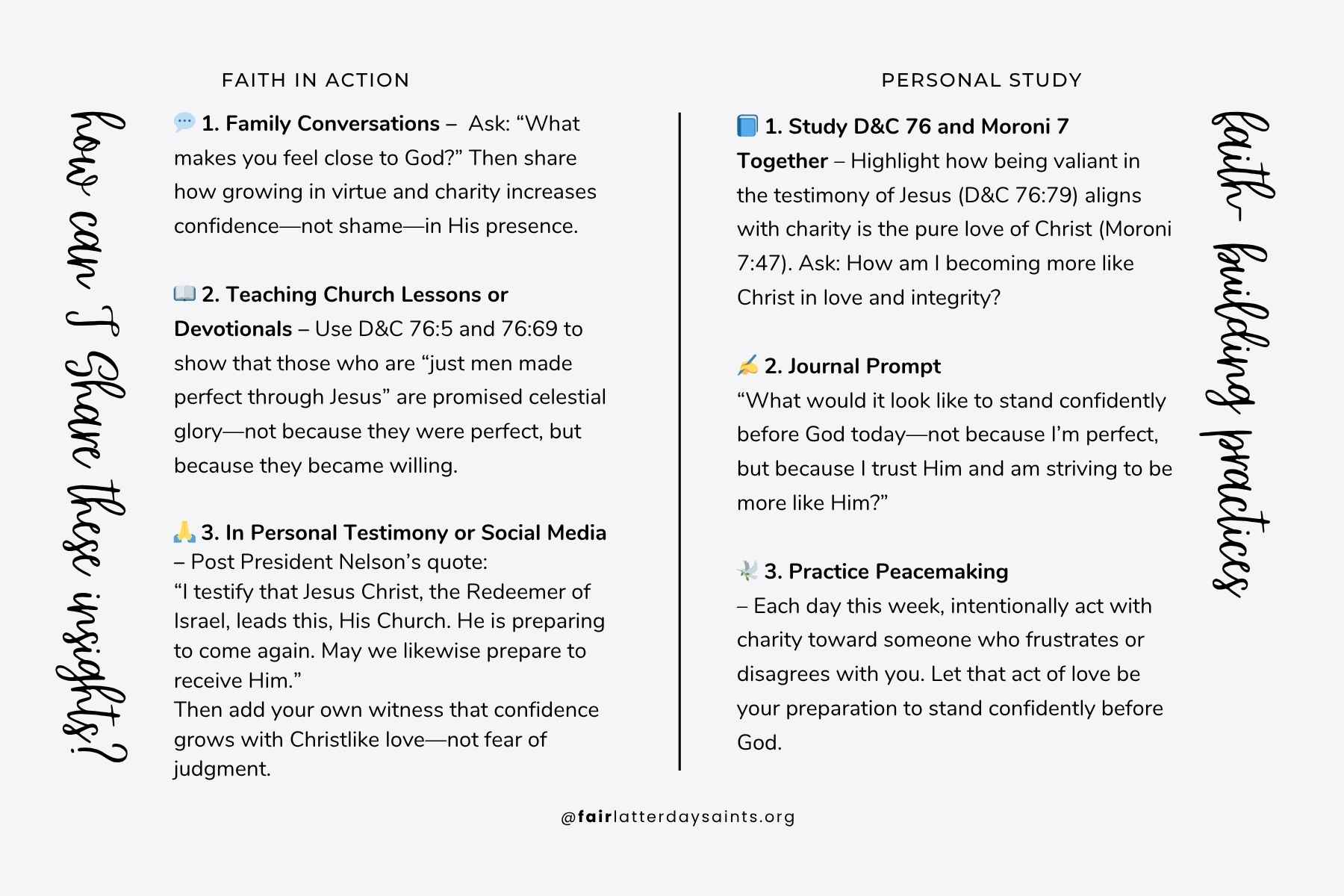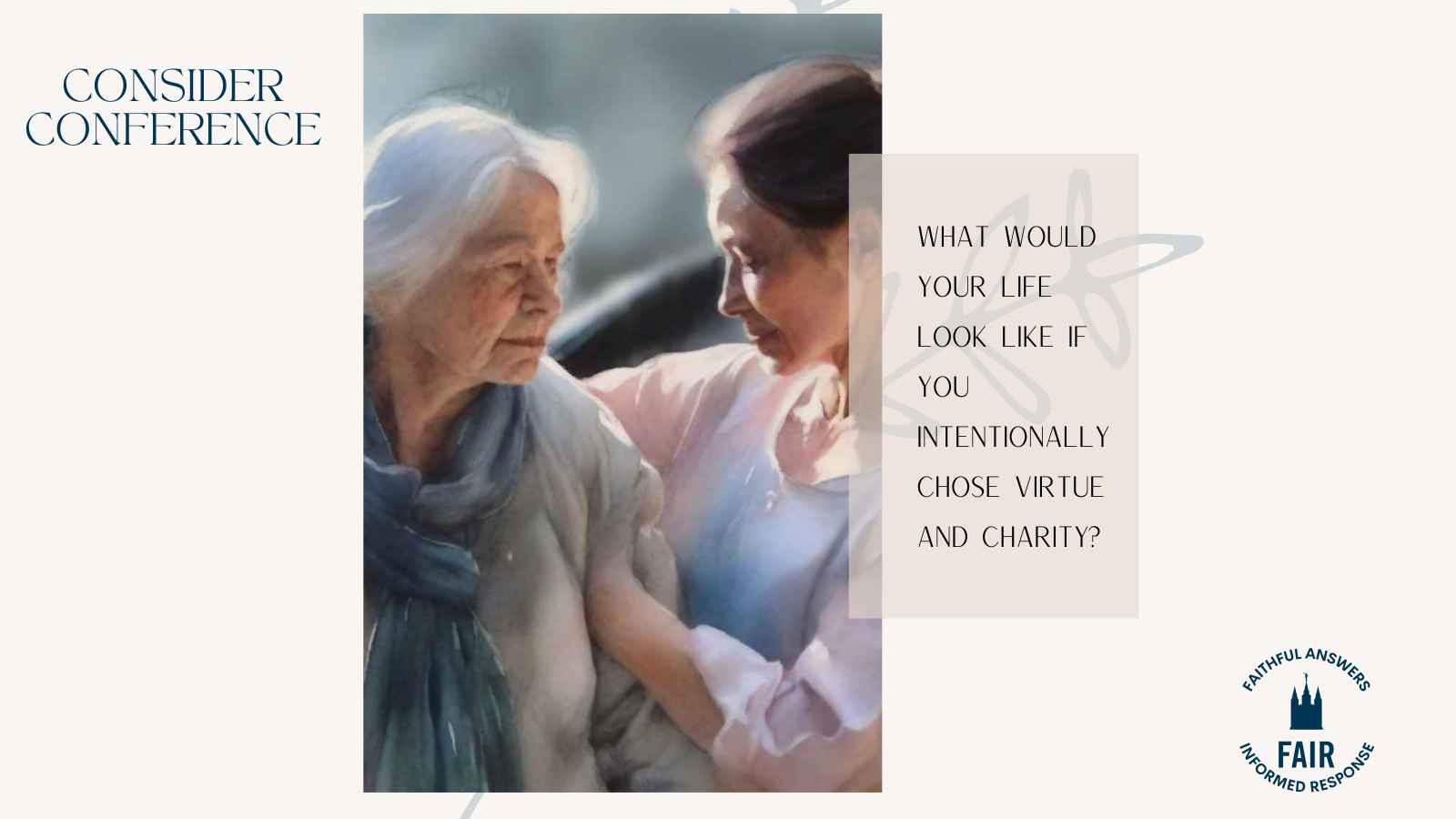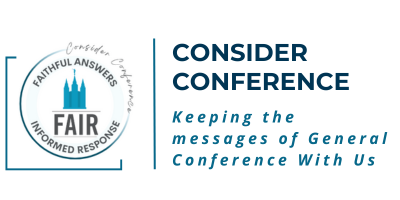
Becoming Holy Through Charity and Virtue
Have you ever felt that eternal life is meant for people holier than you—people more spiritual, more disciplined, more sure of themselves in God’s presence?
In his final remarks at the April 2025 General Conference, President Russell M. Nelson offers a bold and empowering invitation: We can prepare for celestial glory now—by becoming the kind of person who feels confident standing in the presence of God.
But how do we become that kind of person?
President Nelson doesn’t point us to outward signs of worthiness or visible achievement. He draws from Doctrine and Covenants 121, where the Lord declares that “confidence shall wax strong in the presence of God” when virtue and charity guide our lives. These terms are often misunderstood—but President Nelson reclaims them with divine clarity:
Charity is not just a nice gesture. It is the essence of who the Savior is. And it is what He expects us to become.
This talk reframes charity as the divine love that transforms, and virtue as the spiritual power to become holy. These are not distant ideals—they are the pathway to exaltation. Through consistent choices to live with compassion, moral strength, and devotion to Christ, we become more than improved humans. We become celestial beings.
As we study Doctrine and Covenants 76, President Nelson’s message echoes the vision of glory Joseph and Sidney saw—a vision not of hierarchy, but of transformation. What if confidence in our relationship with God is not earned, but grown—through one act of charity and virtue at a time?
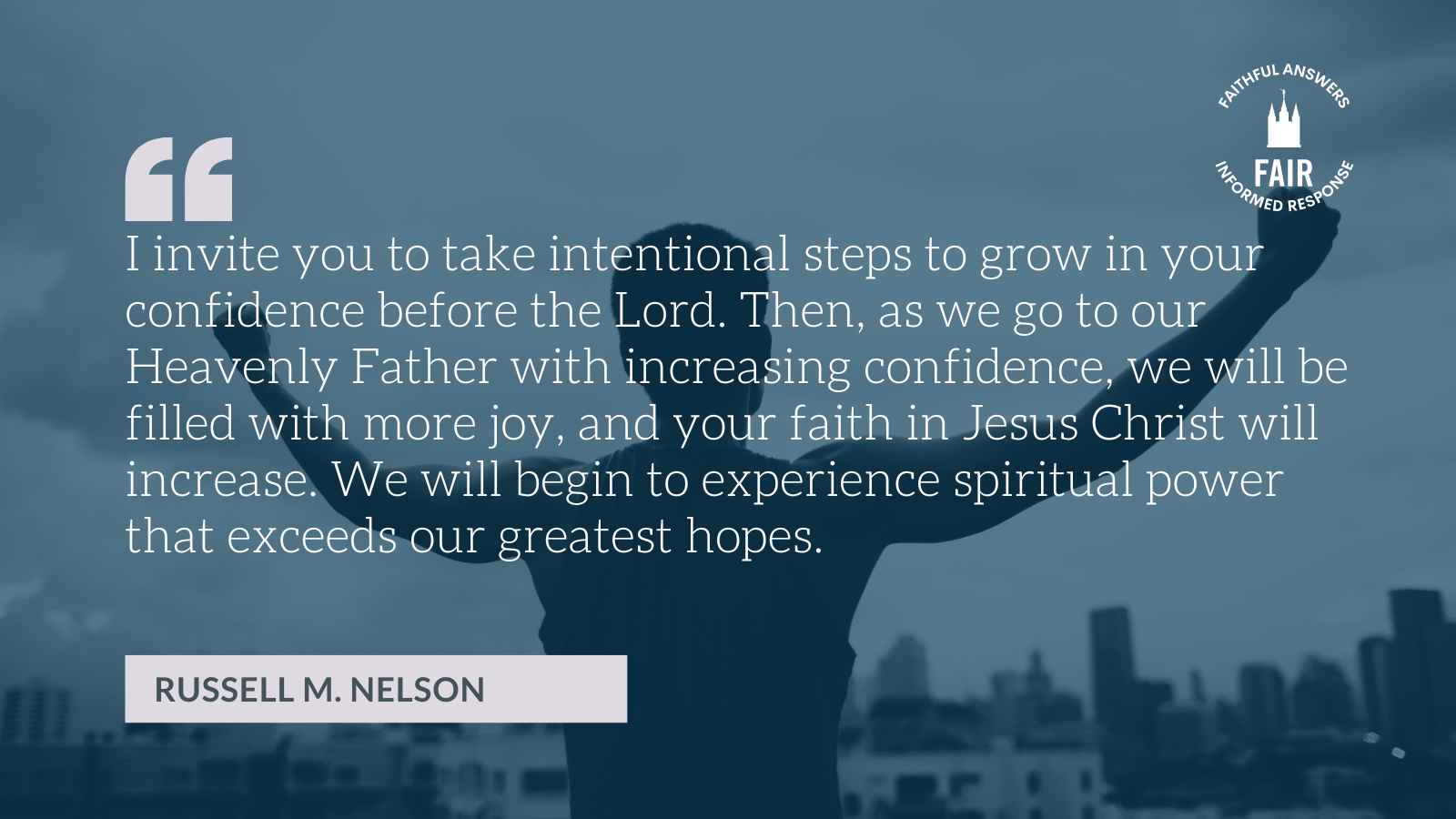
Apologetic Issues: What Does It Mean to Be “Worthy” to Enter God’s Presence?
Misconception: “Your church teaches that only the perfect—or obsessively obedient—can enter heaven.”
Response: President Nelson teaches that confidence in the presence of God is not the reward of perfection—but the fruit of charity, virtue, humility, and covenantal living. These are not standards of exclusion; they are processes of transformation.
Doctrine and Covenants 76 affirms that those who are “valiant in the testimony of Jesus” receive of His fullness and glory (D&C 76:79). The standard is not flawlessness, but valiant discipleship—a willing alignment with divine truth.
He echoes Webster’s 1828 definition of virtue as “voluntary obedience to truth,” reinforcing that virtue is not repression—it is power. The kind of moral courage that fuels sanctification.
“Charity towards all men is essential to our progress. Charity is the foundation of a godly character.” —President Russell M. Nelson
Common Fallacy: False Dilemma – A False Dilemma presents only two options when more exist.
This issue commits the False Dilemma Fallacy—assuming only two extremes: either we are perfect, or we are damned.
Solution: Scripture and modern prophets reject this binary. Exaltation is not pass/fail—it is grow and become. Charity and virtue are not checklists; they are qualities we cultivate in relationship with Christ.
Social Issue: Is “Virtue” Just a Polite Code Word for Shame?
Criticism: “The Church’s focus on virtue, especially for women, seems outdated and shame-based.”
Response: That interpretation reflects modern misunderstanding, not scriptural intent. President Nelson reframes virtue as spiritual strength and personal sanctity, not social compliance. He testifies that it is essential for becoming confident before God.
Joseph Smith and early Restoration teachings often used “virtue” to mean spiritual force —something empowering and divine, not restrictive. When applied as moral courage and obedience to eternal truth, virtue becomes not a burden, but a shield (D&C 121:45–46).
Common Fallacy: Presentism
This critique relies on Presentism—judging ancient or eternal principles by modern cultural norms.
Correction: When we study scriptural definitions in their original context—like Webster’s 1828—virtue becomes liberating, not limiting. It is not about controlling people—it’s about freeing them to live aligned with divine truth.
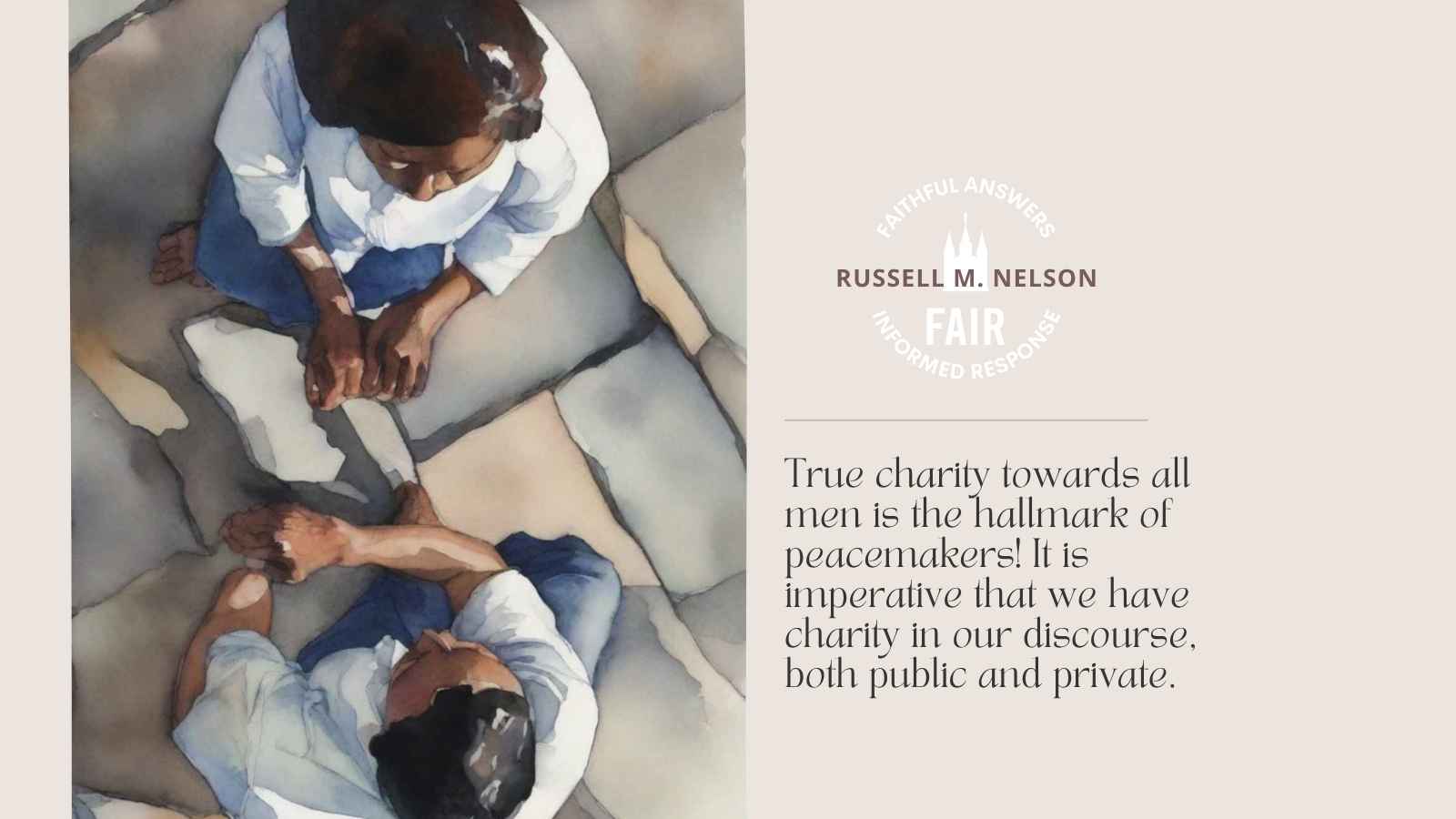
Apologetic Application: Charity Isn’t Just Kindness—It’s Covenant Power
President Nelson’s message brings us back to a divine truth:
Charity is not just an emotion. It is a sanctifying force.
At the heart of exaltation lies charity—not merely good behavior, but a sacred transformation of the soul through Christ. Scripture declares:
“Charity is the pure love of Christ, and it endureth forever” (Moroni 7:47).
And D&C 121:45–46 promises that if virtue and charity adorn our thoughts, we will have confidence before God.
Webster’s 1828 definition of charity is “Supreme love to God, and universal goodwill to men.” President Nelson’s remarks support this definition, reminding us that charity is a doctrinal cornerstone, not social sentiment.
Defending Core Beliefs
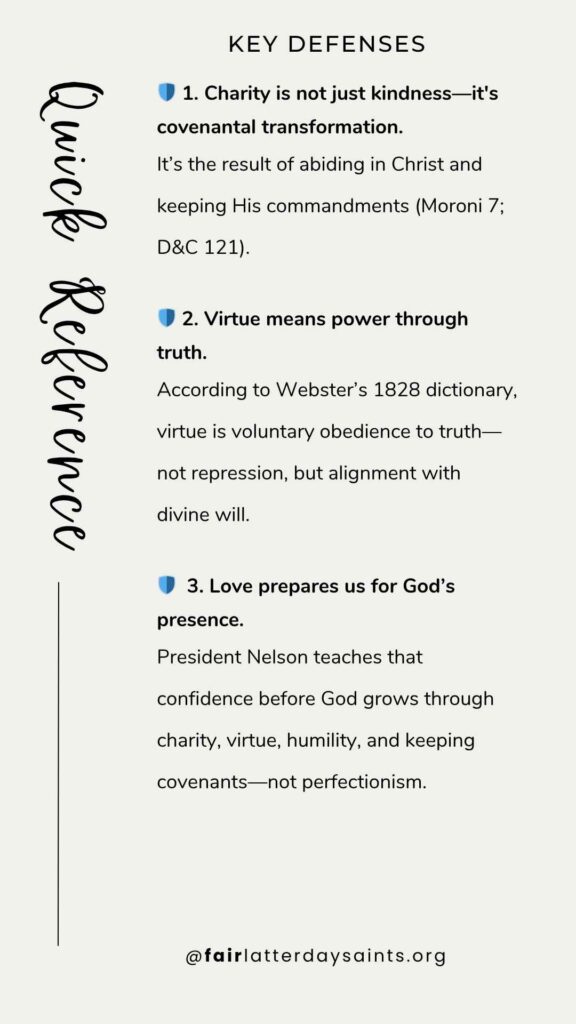 1⃣ Charity just means giving to the poor or helping people in need.
1⃣ Charity just means giving to the poor or helping people in need.
In modern usage, charity often refers to acts of generosity—donating money, volunteering, or offering aid to the less fortunate. While these are good and important, they are outward expressions, not the essence of scriptural charity.
In scripture, charity is “the pure love of Christ” (Moroni 7:47)—a divine attribute that transforms hearts and relationships. It’s not just doing good but becoming good—becoming like Jesus Christ in how we see and treat others.
 President Nelson teaches that charity is what empowers us to become peacemakers in a divided world:
President Nelson teaches that charity is what empowers us to become peacemakers in a divided world:
As charity becomes part of our nature, we will lose the impulse to demean others. We will stop judging others. We will have charity for those from all walks of life. Charity towards all men is essential to our progress. Charity is the foundation of a godly character.
While charity often includes generosity toward the suffering, it goes much further. It leads us to forgive enemies, abandon tribalism, and seek the healing unity of Zion.
Doctrine and Covenants 121:45 links charity to spiritual strength and divine confidence:
“Let thy bowels also be full of charity… and let virtue garnish thy thoughts unceasingly; then shall thy confidence wax strong in the presence of God.”
2⃣ Virtue and charity are lofty ideals, not actionable traits.
Some feel that virtue and charity are abstract (and therefore unattainable) ideals. To them, these qualities seem like ethereal goals that can’t be lived in real, daily life.
President Nelson directly counters this notion. He teaches that charity and virtue are not just qualities to admire—they are powers to cultivate. In fact, he promises that as we intentionally cultivate charity and virtue, our joy and faith will increase.
As we diligently seek to have charity and virtue fill our lives, our confidence in approaching God will increase. I invite you to take intentional steps to grow in your confidence before the Lord. Then, as we go to our Heavenly Father with increasing confidence, we will be filled with more joy, and your faith in Jesus Christ will increase. We will begin to experience spiritual power that exceeds our greatest hopes.
These traits are not passive states—they are choices, repeated over time. Each time we forgive, speak truth with love, curb a cruel impulse, or honor our covenants, we are acting in virtue. Each time we offer mercy, hold back judgment, sacrifice for another, or try to see others as Christ sees them, we are practicing charity.
Historical and Doctrinal Connections
When Joseph Smith and Sidney Rigdon received the vision recorded in Doctrine and Covenants 76, it astonished early Latter-day Saints—not because it was harsh, but because it was too merciful.
Rather than a binary heaven-or-hell judgment, the Lord revealed a spectrum of glory—a plan in which almost all of God’s children would inherit some degree of salvation. To some, this felt threatening. It challenged entrenched notions of exclusivity and punishment. But it also testified of a God who is more gracious, loving, and just than anyone had imagined.
D&C 76:5 begins with a striking reassurance:
I, the Lord, am merciful and gracious unto those who fear me, and delight to honor those who serve me in righteousness and in truth unto the end.
This vision offered not just a theology of rescue, but of refinement. The Celestial Kingdom is promised to those who are “valiant in the testimony of Jesus” (D&C 76:79)—not because of flawless behavior, but because of covenantal transformation through Christ. This is echoed in President Nelson’s bold assertion that charity and virtue are the key to becoming more like Him—that confidence before God is not earned, but cultivated through Christ’s grace and our willingness to be changed.
This week’s Come, Follow Me block (D&C 76) directly supports this doctrine of holy becoming. While D&C 76 unveils the glorious outcomes of those who follow Christ with full purpose of heart, D&C 76:69–70 makes the process clear:
These are they who are just men made perfect through Jesus the mediator of the new covenant, who wrought out this perfect atonement through the shedding of his own blood.
This doesn’t mean being perfect—it means being “made perfect in Christ” (Moroni 10:32), a process fueled by virtue (moral strength and purity) and charity (the pure love of Christ). Both attributes lead us to peacemaking, humility, and trust in divine mercy.
By restoring the fuller picture of God’s justice and mercy, The Vision connects ancient prophetic patterns to modern revelation. From Isaiah’s messianic hope to John’s heavenly visions, to Joseph Smith’s revelatory insight, we see the same eternal pattern: God’s plan is one of restoration, not rejection. And His end goal is not mere salvation—it’s transformation, through Christ.
Living Apologetics: How to Apply This Today
 How can we explain that confidence before God isn’t arrogance, but a spiritual gift available to all who walk the path of discipleship?
How can we explain that confidence before God isn’t arrogance, but a spiritual gift available to all who walk the path of discipleship?
President Nelson’s message turns a common narrative on its head. Rather than portraying divine confidence as something earned only by the ultra-faithful, he teaches that confidence is cultivated as we grow in virtue (moral integrity) and charity (Christlike love).
This is apologetically powerful—especially in a world where religion is often seen as shame-inducing or exclusionary. The gospel of Jesus Christ invites us to be transformed, not tormented. When we follow Him with sincerity, the fruits of that journey include peace, confidence, and assurance in our standing with God—right now, not just after death.
Principle in Practice: Two Ways to Apply Apologetic Principles
1⃣ Reframe Misconceptions About Worthiness
When someone says, “Your Church makes people feel like they’re never good enough,” try responding:
→ “Actually, we believe worthiness isn’t about being flawless—it’s about being willing. Confidence before God comes from striving with real intent, not checking boxes.”
Then add President Nelson’s insight: “Charity and virtue will qualify us for the Holy Ghost and assure us that we will be prepared to stand confidently before God.”
2⃣ Define Charity Beyond Generosity
If someone thinks “charity” just means giving to the poor, gently clarify:
→ “Charity isn’t just what we do—it’s what we become. The pure love of Christ turns us into people who bring peace, forgive quickly, and walk with humility. That’s why it leads to confidence—it shapes us into someone ready to see God face to face.”
Top Apologetic Facts
 1. Charity isn’t just kindness—it’s transformation. (Doctrinal Insight)
1. Charity isn’t just kindness—it’s transformation. (Doctrinal Insight)
Many assume charity means giving to the needy, but in scripture, it means becoming like Christ. As Moroni 7 teaches, “charity is the pure love of Christ”—a divine attribute, not just an action. President Nelson affirms that cultivating charity changes who we are, empowering us to stand confidently before God.
 2. Confidence before God is a spiritual gift, not a personality trait. (Practical Application)
2. Confidence before God is a spiritual gift, not a personality trait. (Practical Application)
Some believe confidence in God’s presence is presumptuous or reserved for prophets. But D&C 121:45–46 and President Nelson’s talk teach that confidence grows from virtue and charity. This doctrine reframes worthiness as progress, not perfection.
 3. Doctrine and Covenants 76 connects transformation with celestial glory. (Historical Context)
3. Doctrine and Covenants 76 connects transformation with celestial glory. (Historical Context)
Revealed in 1832, D&C 76 emphasizes that those who inherit celestial glory are “just men made perfect through Jesus.” President Nelson echoes this eternal pattern: through Christ, ordinary disciples can become holy—not just later, but now.
Conclusion: Reclaiming Sacred Language and Power
President Nelson’s prophetic message redefines confidence—not as pride or entitlement, but as the fruit of charity and virtue, cultivated in covenant living. When we grow in the pure love of Christ, we begin to see ourselves as God sees us: not as impostors or pretenders, but as becoming holy through His power.
This week’s Come, Follow Me lesson in Doctrine and Covenants 76 expands that vision. It reveals a God who glorifies the faithful, not for their perfection, but for their willingness to be made perfect through Christ. The traits we often reduce to vague ideals—charity, virtue, holiness—are actually sacred tools for transformation. When lived intentionally, they prepare us for celestial glory and give us peace in God’s presence now.
Let’s reclaim this sacred language. Let’s teach our children, our friends, and ourselves that these are not passive virtues—they are actionable ways to become more Christ-like..
You can become holy. You can live in truth and love. You can stand confidently in the presence of God.
“The great opportunity before us is to become the people God needs us to be.” —President Russell M. Nelson
What would your life look like if you intentionally chose virtue and charity?
The Consider Conference series by FAIR offers an in-depth look at recent General Conference talks to help members of the Church of Jesus Christ of Latter-day Saints navigate common questions, misunderstandings, and criticisms. Each post provides doctrinal insights, historical context, and practical ways to apply gospel principles in everyday conversations. Through this series, we hope to equip readers with faith-promoting resources that encourage thoughtful reflection, respectful dialogue, and a stronger foundation in gospel truths, fostering both personal conviction and meaningful discussions with others.
The post Confidence in the Presence of God appeared first on FAIR.
Continue reading at the original source →




